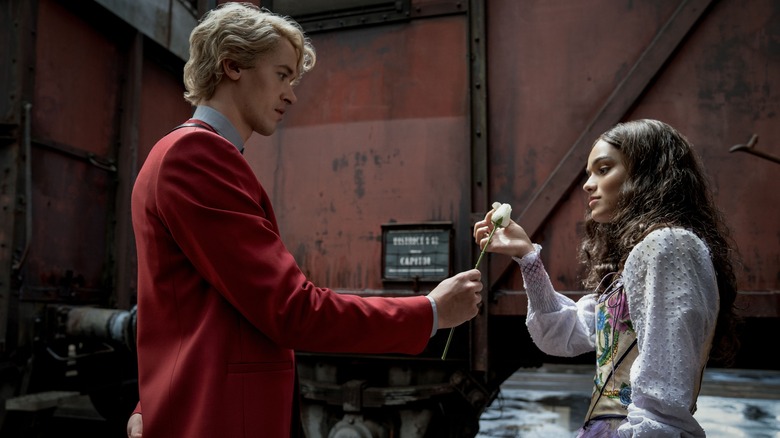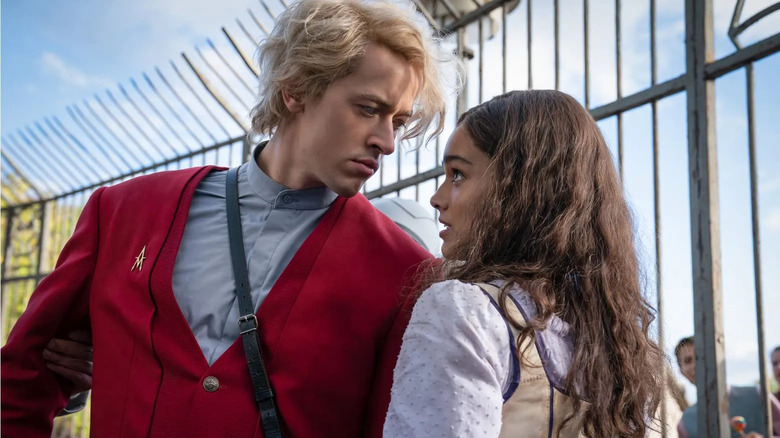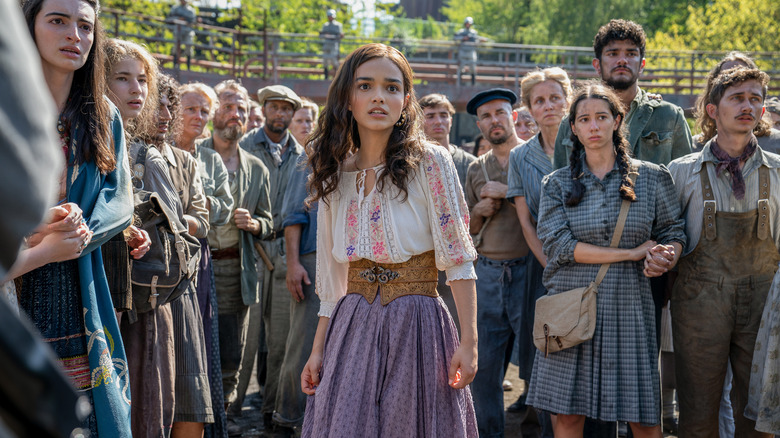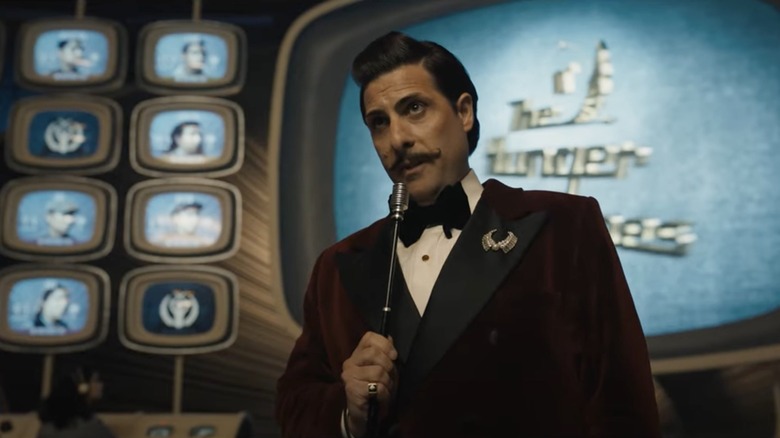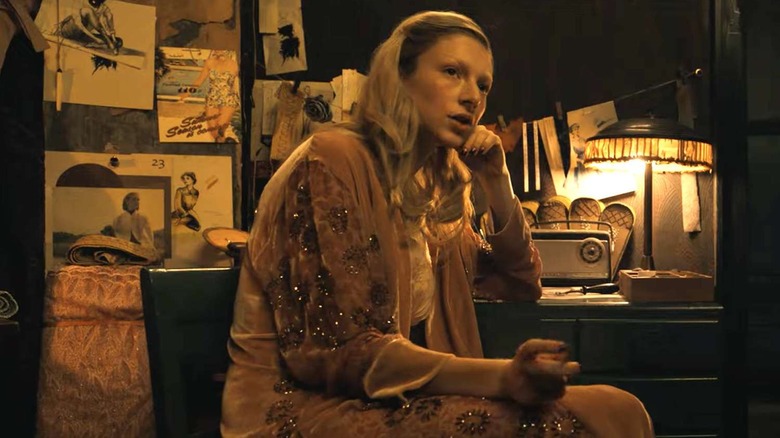How The Ballad Of Songbirds And Snakes Director Made A Vital Hunger Games Prequel [Exclusive Interview]
Francis Lawrence didn't direct the first "Hunger Games" movie, but he directed the rest of them, and he's made the series his own. Starting with "The Hunger Games: Catching Fire" and continuing through the rest of the films, Lawrence has showcased an eye for thrilling and horrifying visuals and a keen ability to draw the best out of his actors, whether they're going broad or subtle. Through his lens, what could've been a boilerplate YA series has leaned into the aggressive, the political, and the deeply moving.
Lawrence is back with "The Hunger Games: The Ballad of Songbirds and Snakes," a prequel telling the story of young Coriolanus Snow, who will grow up to be the vicious dictator with his thumb on the sci-fi dystopia of Panem in the original four films. It's arguably the best and most thematically ambitious film in the series, putting the audience in the company of a fascist for two and a half hours and toying with their emotions. You know this guy isn't going to change, and that he's going to destroy everyone and everything around him, but you keep waiting for the pivot nonetheless. It's a grueling experience, and one that falls right in line with Lawrence's previous films. The righteous anger of the previous entries feels even more welcome once you get to Snow himself, and understand how he ticks.
I sat down with Lawrence over Zoom to talk about "The Ballad of Songbirds and Snakes," how the movie makes you sympathize with the devil, the origins of Rachel Zegler's stellar musical performances, and the real-world history that inspired the look of Panem.
Note: This interview has been lightly edited for clarity and brevity.
'Eventually, in his descent into darkness, you find it sort of truthful'
Because audiences are so aware of how stories work, we keep on waiting for Snow to have that redemption moment. But it never comes. The movie is a slow reveal that we've spent time with a monster, and felt affection for a monster. Can you talk about the difficulty of making a character who is so inherently evil also somebody that we genuinely relate to?
That was honestly ... I will say part of why I wanted to do this movie is when I read the manuscript, I just so loved that it was a "Hunger Games" movie, but very different in terms of narrative structure, but a narrative journey for a character. But we also knew that the biggest trick in getting this movie right, because people know that he's the villain from the other movies, is to sort of get him to a place in the beginning where we can get the audience behind him, rooting for him, empathizing with him, while making sure that the elements of, the need for ambition, some of the greed, some of maybe the genetic darkness that's in him from his father, that all those seeds are planted. So eventually, in his descent into darkness, you find it sort of truthful.
We knew that was going to be the trick, but I think a lot of it was there because this is an unformed Snow. When you meet him and he is young and he's struggling, and his goals are to put food on the family's table and he's trying to win this prize, and he's hiding the fact that his family's fallen from grace from around all the other entitled kids that he's at school with, and you know that he's not philosophically where Donald Sutherland is in the other movies yet, I think we were able to get audiences behind him and rooting for him. And surprisingly so, I will say, that even when we were first testing the movie, I think people were rooting for him for almost too long, and almost forgiving the things that he does. It was an interesting experience.
It's a real 2023 mood for a movie to be about how this person you really like is actually a fascist. It feels very timely right now.
Yes, yes, for sure. But we get to see him formed into one. He doesn't start as one.
'So it really all came from that late '40s, early '50s, post-war Berlin'
So this is clearly Panem, but decades before the original movies. The reverse engineering of what this world looks like 70 years earlier fascinates me. Can you talk about the directives you and your team gave yourselves to ensure that yes, this is the same place, just in a different time?
Yeah, we always had certain elements of aesthetics that we could pull from the previous movies. And when I came on and we saw much more of the Capitol, different side of the Capitol, and because it was this anniversary year, we could build out the Capitol in a grander way than the first movie. Weirdly, a lot of what we've based the Capitol on in "Catching Fire" and the "Mockingjays", is on the original plans for Germania. If Hitler were to have won the war, and he had the plans laid out for what the city was going to look and feel like. So a lot of that look and feel was based on that. When we went to start this movie, and I worked with Uli Hanisch, who's a Berlin-based production designer. He and I started having conversations that because this story takes place 10 years after the wars that kick off all the games themselves, it's still in a bit of a reconstruction era.
So we started to look at Berlin, again connected to Germania, but Berlin post-World War II. That reconstruction era of '45 into the early '50s, to see, is there rubble on the streets? Is there scaffolding? Where are the cranes? What's still in rubble? What classic buildings are being reconstructed? What new buildings are popping up? With little hints toward what Panem might look like in the future. And then because we were looking at that era, it started to inform other things. It started to inform auto design, it started to inform hair. It started to inform makeup and wardrobe, and even technology. We started talking about, this is a much more rudimentary time in the Capitol's history. The games are more rudimentary, the technology has to be. So we also looked at the same era. So it really all came from that late '40s, early '50s, post-war Berlin.
Rachel Zegler's character is very much defined by her songs and her singing voice. How did the songs come together and how did you determine their very specific folk and country sound?
A lot of that came from [author Suzanne Collins]. Basically, Suzanne has a pretty vast knowledge of country music. I think she was actually a country music DJ at one point, which is fun. So she told me there was going to be a big music element in the book. I read the manuscript and I read the lyrics and I could see that. And then she and I had long conversations about it and she had a lot of references for the music and the orchestration of the band. She actually pointed me in the direction of the Ken Burns documentary about country music, which I loved. It was during the pandemic, so 16 hours that I watched and it was amazing. But I fell in love with that era from turn of the century, into the '20s and '30s, like the Carter family and when people were collecting these songs or ballads that had been passed down through generations, often from England, Ireland, Scotland. And then orchestrate it with maybe a fiddle, a guitar, a standup bass or something, a little drum. Very simple, playing in saloons, around people's porches. But very much from that District 12, which is West Virginia, Appalachia, that feel. And I fell in love with that sound. Suzanne already loved that sound.
So then we went to Dave Cobb, who's a Nashville-based producer, songwriter. And he had conversations with me about the music and Suzanne about the music. And then he wrote the melodies and the chord progressions to go with Suzanne's lyrics. Did a recording with the instrumentation that we needed for the band. And then Rachel came in, and we recorded her. But her recordings were almost more of a rehearsal, to make sure that she fell into the sound, the genre, all that kind of stuff. So she could work with Dave a little bit. But she fell in really seamlessly into the style that we needed. Then she was able to sing live on set every day. So that was also amazing. So no lip syncing or anything, whether she's on a mic or singing acapella, it was all live.
'I liked that there was a different structure, that it wasn't just ending with the games...'
Jason Schwartzman's Lucky Flickerman provides the movie with extreme gallows humor and even the bleakest moments have these big laughs. Were you concerned about that character being as funny as he is, when the movie is as dark as it is?
No, we were looking for it. Look, it's something that you have to modulate. Because the truth is, part of the power of these movies, I believe, is the emotional impact of the brutality and the violence. It's not the gore, it's not the act itself, but it's the consequence of it is important. You want levity, you need contrast in movies. You need some joy in movies, you want laughter in movies. And we had an opportunity for levity with him. We had opportunity for levity to shine a light on how callous the Capitol is while these horrible things are happening. But we also had to be careful, and we had plenty of material and a lot of stuff got cut out, because there's also times you don't want to take the air out. When you have something that's really emotional or really impactful and you want to sit in that for a minute. You don't always want to cut to Lucky cracking a joke about it. But other times, it worked. So it was something that we'd had to really work on in the edit to get the modulation correct.
I hadn't read the book before I saw the movie, so when the film seems to reach a climax, and suddenly I realized that it hasn't, it was jolting. Were you intimidated by the film structure, the surprise fourth act, that informs the last hour of the movie? How do you make sure the audience stays on board even though the film deliberately has to slow down in order to lure you into this epilogue?
I think the only thing that intimidated me is that I feel like people are conditioned to believe that a "Hunger Games" movie is over when the games are over. And so there's just this feeling that people have. It's like, "Oh, you build up to the games. You get to the games. The games are over. Movie done." And the truth is here, all the questions that are set up at the beginning of the movie are not answered by the end of these games, and there's still a fair amount of story to tell. I found that very exciting. I liked that there was a different structure, that it wasn't just ending with the games, that the games are just part of a much larger story — especially for Snow. So that was exciting, but I knew that we were going to have and will always probably have a bit of a hump, just because people are conditioned to feel that.
There's been a real resurgence with Gen Z of watching the "Hunger Games" movies. And as a millennial, those movies were really important to me when they first came out. But people who are much younger than me are watching them and saying, "Oh yeah, I feel this." What do you hope that younger folks in Gen Z get from the "Hunger Games" movies?
I hope they get the same thing. I think part of the power of them is that Suzanne writes from a thematic place, so she did the original series about the consequence of war. I think this one's about the state of nature debate, of who are we really as humans? Are we brutal and savage, or are we, by nature, good and deserving of rights and freedoms? And so A, are you entertained? Do you have a fulfilling, emotional ride watching these movies? But B, can you also talk and think about what these things are saying, and why they're relevant? And I think the unfortunate thing with the world is these stories that Suzanne have written are always going to be relevant. I just think that she's talking about things that unfortunately we as humans can never seem to get past. And that's why I think that they will probably keep resonating.
'I would be happy to go back if she wrote something else'
So I guess the inevitable question. Regardless of whether Suzanne Collins writes another book, are you interested in returning to Panem, exploring another era, or telling more Snow stories?
I have to wait for Suzanne. That's the thing. Because again, I just love that she comes up with something thematic and then writes from there. So it feels like it has just a reason to exist. And so I get asked this a lot, and I know a lot of fans are like, "Oh, do the Finnick Games, do the Haymitch Games, or let's do a Tigris spin-off," or something like that. But it's not just about picking a character and doing a games. Suzanne has to have something to say. I would be happy to go back if she wrote something else.
I think I'm conditioned to be cynical about prequels in general, but this one feels vital. It now feels like you don't know the whole story until you've seen this movie. What is the key to locking down a prequel, making sure a prequel actually matters?
I think you're right. I think there's a few things. One is, what I was just talking about, is the thematic material. Does it have a reason to exist? Is there a relevance to it? I think that's probably the biggest thing. The next thing I would say is, can you tell a very different story? Can you feel like you are truly in a "Hunger Games" movie, but we're not doing "girl sacrifices herself, and now is on a survival mission" story. Let's do a story about a young man's descent into darkness. So it's a very different kind of a story there.
Then I think what also makes it vital for the series, and what I really loved about reading the manuscript for the first time, is it's truly an origins story. And not just about Snow, but it's origins of songs we know, origins of behavior that we've seen and know, origins of characters and character dynamics. And it gives new insight into lines of dialogue that you have heard from one of the other movies and now you think differently about it once you see this. It's the origins of the games, the audience participation starting, the expansion of the landscape. So it adds to the mythology, it changes the mythology a little bit. But for me, just in that sense alone, it's vital.
"The Hunger Games: The Ballad of Songbirds and Snakes" is in theaters now.
